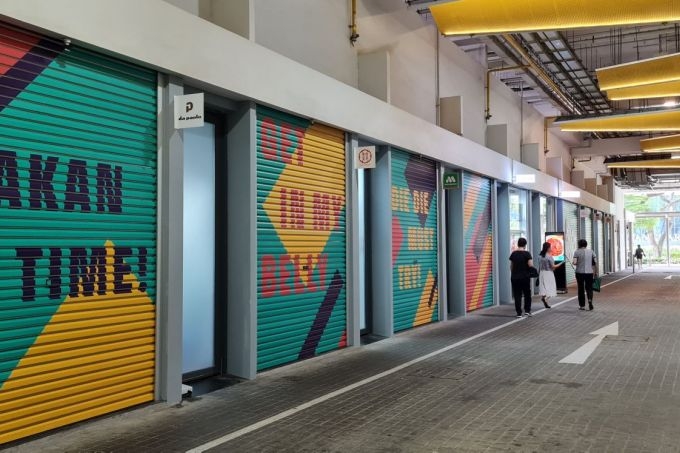Portfolio of 29 cloud kitchen units at Lavender Street served up for sale

DESIGN and construction firm Chiu Teng Group is understood to be selling its portfolio of 29 ground-floor cloud kitchen units at CT Hub 2 via expression of interest.
Also known as ghost or dark kitchens, cloud kitchens are centralised kitchens where food is prepared primarily to cater to food delivery. In some cases, a small area is set aside for dining-in.
According to sole broker Colliers, the portfolio for sale comprises units ranging from 26 to 42 square metres (sq m), making up a total strata area of 906 sq m.
Located at 114 Lavender Street, the commercial property is approved for food & beverage (F&B) use and fully leased, with Deliveroo Editions as its major tenant. It houses familiar names such as Mos Burger, Da Paolo, Teppei Syokudo, Pho Stop, Kings Cross Bar and Restaurant, Donburi Yo! and FortyThieves. Before Phase 2's heightened restrictions, the kitchens offered both dine-in and pick-up options.
They gained patrons from the nearby industrial district in Bendemeer, as well as residences in the estates at Boon Keng and Kallang.
CT Hub 2 is also a three-minute walk from Bendemeer MRT station, with connections to Lavender Street, Kallang Road, Central Expressway, Kallang Paya Lebar Expressway and Pan Island Expressway. The 99-year leasehold property was completed by Chiu Teng Group in 2015.
Colliers had not disclosed a guide price. However, some three months before, a 312 square foot or 29 sq m cloud kitchen unit located in the same area was listed on Commercial Guru for S$592,800 or S$1,900 per square foot.
On the cloud kitchens, Steven Tan, senior director of investment services at Colliers, said: "This fully leased property is a unique opportunity for investors to generate immediate income with the potential for future rental appreciation."
Despite the expected growth in returns, the site was put up for sale in early May. Lee Nai Jia, the deputy director of the Institute of Real Estate and Urban Studies (IREUS) at the National University of Singapore, ventured that this might be because the seller is looking to recycle their capital and reinvest into other opportunities.
"There is a strong interest, and they are able to get a better valuation for the properties today compared to the future. The landscape in the future may be more competitive, which may add downward pressure on vacancy and correspondingly yield," said Dr Lee.
Brenda Ong, executive director of Cushman & Wakefield's industrial and logistics business, added that the timing is "opportune", as last year's circuit breaker period piqued interest in cloud kitchens.
This demand is further backed by the limited supply of such assets. Ms Ong noted that before an industrial space can be used as a cloud kitchen, it must first obtain the necessary approvals from the Singapore Food Agency, the Urban Redevelopment Authority, and other related parties. It must also be fitted with adequate water supply, grease traps and exhaust systems.
"Our understanding is that the units are all with F&B status, but not all come with exhaust. Deliveroo is one of the tenants leasing the F&B space with exhaust from the landlord," she said.
At the same time, Singaporeans are also acquiring a taste for food delivery services.
According to Statista's digital market outlook report published in September last year, the online food delivery business in Singapore generated S$342.1 million of revenue in 2019, a 27.6 per cent increase from 2018's S$268 million. It also predicted the industry to grow 6 per cent year on year in 2024 to reach S$698.3 million in revenue.
The digitalisation of F&B businesses, backed with changing consumer habits brought about by the Covid-19 pandemic, has also cooked-up an appetite for cloud kitchens among businesses.
In January and October last year, Grab launched its two cloud kitchens in Singapore located at Hillview and Aljunied respectively. The ride-hailing company said that such centralised food preparation facilities enable merchants to meet the rising demand for food delivery services in cost-effective ways.
Food services company Select Group, which is behind Pho Street and Hong Kong Sheng Kee Dessert, also announced in March that it would channel S$10 million over the next five years to invest in 20 cloud kitchens. This came after the company saw a 200 per cent yoy surge in delivery orders for many of its brands in 2020.
To differentiate itself from other players, Select plans to open the kitchens in densely populated heartland areas such as Clementi and Tampines.
Globally, the cloud kitchen market is expected to grow to US$71.4 billion by 2027, up from US$43.1 billion in 2019, according to estimates from Allied Market Research.
Kishin RK, the son of Singaporean real estate magnate Raj Kumar, told Bloomberg last year about his plans to establish some 1,000 cloud kitchens across the Asia-Pacific, Europe and the United States.
"The investment into cloud kitchens is an opportunity to look at real estate with a different lens and create revenue from a space which may not be as relevant anymore," said Mr Kishin, who founded food tech and digital restaurant company TiffinLabs.
The expression of interest for the cloud kitchen at Lavender will close at 3pm on June 8.




